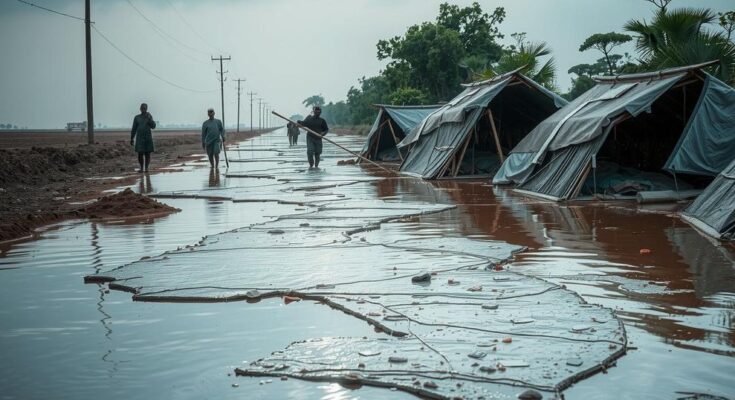In South Sudan, annual flooding has displaced thousands, forcing them to take refuge along a canal. The climate crisis worsens challenges for pastoral communities as traditional practices become unviable. With limited resources and inadequate healthcare, reliance on food aid intensifies, raising concerns about long-term sustainability and welfare for the displaced.
In Ayod, South Sudan, long-horn cattle navigate through extensive floods, now a harsh reality for many families who have sought refuge along a canal. Smoke rises from huts made of mud and grass where thousands reside after their villages were submerged. Bichiok Hoth Chuiny, a septuagenarian, lamented her suffering stating that she had never been forced to flee her home before. The continuous flooding is attributed to climate change, worsened by the opening of upstream dams, impacting over 379,000 individuals this year alone. With the growth of the swamp since the 1960s, traditional practices of livestock rearing and farming have become increasingly untenable for the Dinka, Nuer, and Murle communities.
Since gaining independence in 2011, South Sudan has struggled with civil strife and natural disasters, leaving millions internally displaced. The incomplete Jonglei Canal, envisioned over a century ago, currently provides limited sanctuary for the flood-displaced. Leaders like Peter Kuach Gatchang of Pajiek express gratitude that the canal mitigates flooding impacts, yet they mourn the lack of essential services, including schooling and medical facilities.
Women such as Nyabuot Reat Kuor depend heavily on food aid that has been diminished due to funding cuts, walking to receive rations while predicting dire future food shortages. The inadequacy of healthcare facilities further compounds their plight, as essential supplies remain low due to economic instability and disruptions in oil exports. Venomous snake bites pose additional risks as people venture into floodwaters for sustenance. The situation in South Sudan remains critical, urging national and international attention for aid and intervention.
South Sudan faces a dire humanitarian crisis characterized by annual flooding, resulting in repeated displacement and destruction of livelihoods. The country’s vulnerability to climate change has been acknowledged by the World Bank, underscoring an alarming need for adapted responses. The gradual expansion of floodwaters since the 1960s has catastrophic effects on agriculture and livestock reliance, particularly among pastoral communities inhabiting Jonglei state. Additionally, stagnation in infrastructure development and continued political instability has exacerbated these challenges, making coping mechanisms for affected populations increasingly inadequate. Economic crises further complicate the landscape, contributing to a loss of healthcare services and reliable food assistance, as well as increased health risks from exposure to dangerous wildlife. This scenario calls for immediate actions and support on multiple fronts, from humanitarian aid to sustainable development solutions.
The ongoing flooding crisis in South Sudan presents a severe challenge, with thousands displaced and enduring inadequate living conditions. The impacts of climate change, coupled with political instability and economic strife, have resulted in a humanitarian emergency that diminishes the community’s ability to cope effectively. As the situation becomes more desperate, reliance on food aid is likely to deepen, introducing long-term implications for health and food security. Urgent intervention and commitment are essential to address the underlying issues and support the affected populations.
Original Source: abcnews.go.com




